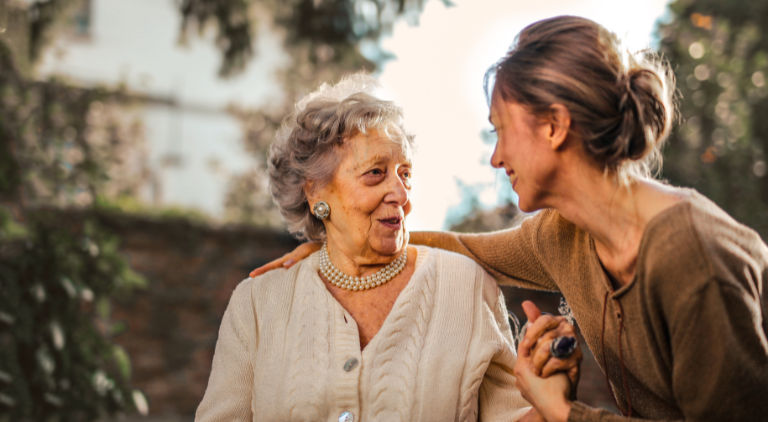
As the seasons change, so do the potential risks and challenges for seniors with memory loss. Those with dementia or Alzheimer’s can be impaired in their ability to navigate environmental changes, making safety an even more significant concern. Families and caregivers are critical in helping seniors stay safe and comfortable throughout the year. Here are some seasonal safety tips to ensure that seniors with memory loss are always protected and cared for.
Winter Senior Safety Tips
Preventing Hypothermia
Seniors with memory loss may forget to dress appropriately for cold weather. Caregivers should ensure seniors wear layers, including hats, gloves, and scarves, before venturing outside. Indoors, maintain a comfortable room temperature and check for drafts.
Avoiding Falls on Ice and Snow
Wintry conditions increase the risk of slips and falls. Install slip-resistant mats near doorways and clear pathways, driveways, and stairs of snow and ice. Consider equipping shoes with ice grips or traction aids.
Managing Wintertime Depression
Shorter days and less sunlight can lead to seasonal affective disorder (SAD). Encourage exposure to natural light or consider light therapy. Engaging seniors in activities they enjoy can also boost their mood.
Monitoring for Carbon Monoxide Poisoning
Improper use of heating devices like space heaters or fireplaces can lead to carbon monoxide poisoning. Install carbon monoxide detectors and ensure proper ventilation in living spaces.
Spring Senior Safety Tips
Preparing for Allergies
Spring brings pollen and allergens, which can exacerbate respiratory issues. Keep windows closed during high-pollen days and use air purifiers. Ensure that prescribed medications are taken as directed.
Maintaining Hydration During Outdoor Activities
As temperatures rise, ensure seniors stay hydrated when engaging in outdoor activities. Provide water bottles and encourage regular breaks in the shade.
Managing Spring Cleaning Hazards
If spring cleaning is underway, keep seniors away from areas with cleaning chemicals or clutter that could pose a tripping hazard. Simplify their environment while ensuring their living space remains safe and organized.
Watching for Storms
Spring often brings thunderstorms and unpredictable weather. Prepare an emergency kit with essentials like medications, water, and flashlights, and review a safety plan with the senior.
Summer Senior Safety Tips
Preventing Heat-Related Illness
Seniors with memory loss may not recognize the signs of overheating or dehydration. To prevent this, ensure they wear lightweight, loose-fitting clothing and hats outdoors. Also, they should be offered water regularly and avoid outdoor activities during peak heat.
Protecting Skin from Sunburn
Use sunscreen with at least SPF 30 on exposed skin and encourage seniors to stay in shaded areas. Sunglasses can protect their eyes from harmful UV rays.
Ensuring Pool and Water Safety
If swimming or other water activities are part of their routine, constant supervision is necessary. Safety devices like life vests should be used, and the pool area should be securely fenced when not in use.
Managing Insect Bites
Insects like mosquitoes and ticks can pose health risks. Use insect repellents and check for bites after outdoor activities. Remove standing water around the home to minimize mosquito breeding.
Autumn Senior Safety Tips
Navigating Slippery Leaves
Wet leaves can create slippery surfaces. Therefore, it is recommended that walkways and driveways be regularly cleared and that seniors wear shoes with good traction when outdoors.
Preparing for Flu Season
Fall marks the start of flu season, and seniors with compromised immune systems are at higher risk. Schedule flu vaccinations and ensure they practice good hygiene, like frequent handwashing.
Adjusting to Daylight Saving Time
Changes in daylight hours can disrupt routines. To help seniors adapt quickly to the time shift, they should gradually adjust their sleep and activity schedules.
Managing Seasonal Transitions
As temperatures drop, ensure seniors have appropriate clothing for cooler weather. Check that heating systems are functional and ready for use.
General Senior Safety Tips for All Seasons
Maintaining a Safe Environment
Adapt the home to minimize hazards year-round. Install bathroom grab bars, use nightlights in hallways, and keep pathways clear of clutter.
Using Identification for Wandering
Seniors with memory loss may wander, regardless of the season. Provide wearable identification with contact information, such as a bracelet or a medical ID tag. For additional safety, consider using GPS tracking devices.
Keeping Emergency Contact Information Handy
Ensure that emergency contact numbers are easily accessible and programmed into phones. Post the information in visible areas, such as on the refrigerator.
Encouraging Social Engagement
Loneliness and isolation can worsen memory loss. Encourage participation in community activities, support groups, or family gatherings tailored to their interests and abilities.
Special Considerations for Caregivers
Staying Informed
Learn about the specific needs of seniors with memory loss during different seasons. Awareness can help you anticipate potential risks and address them proactively.
Communicating Clearly
Provide simple, reassuring explanations about seasonal changes. Use visual aids or written reminders if necessary.
Prioritizing Self-Care
Caregiving can be physically and emotionally demanding. Take time to rest, seek support, and connect with resources that can ease your responsibilities.
SeniorCare Companions Can Help
Every season brings unique joys and challenges, but with careful planning and attention to detail, seniors with memory loss can remain safe and enjoy the changing seasons. Caregivers can ensure their loved ones thrive no matter the season by fostering a supportive and adaptive environment. If you’re seeking professional assistance, SeniorCare Companions offers personalized care services tailored to meet the needs of seniors and their families.

